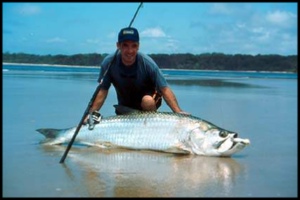EACH PAGE HERE IS AN EXTRACT FROM THE EBOOK.







The common factor in all fish of interest to the marine fly fisher is that they move
into the shallows to feed. This is normally at high tide, so the fishing is limited
to a few hours each side of that time. Most successful locations are already well
known by reputation, so a few questions in the area angling shop should set you on
the right path. Look for areas with a shallow sandy coverage for most fish, preferably
with an eel grass or similar flora. Other species will be found in the sluggish shallows
in estuaries.
The permit, Trachinotus falcatus, is found in the warm tropical waters of the western
Atlantic, particularly the coasts of the Bahamas and southern Florida. Its habits
are similar to the bonefish, feeding in the shallows on crabs and crustaceans as
well as shellfish and sea urchins. They are known to grow to over 50lb, so a robust
fly fishing set up is called for including a reel with substantial backing. They
are considered one of the finest light-tackle game fish and their deep body construction
ensures that they will fight exceptionally hard. Use similar fishing equipment to
that required for bonefish.
There are some additional precautions to bear in mind when saltwater fly fishing.
You must realise that your favourite fly rod and reel may not be designed for use
in a saltwater environment. The furnishings of some rods and the mechanics of many
fly reels are definitely not designed to withstand the corrosive effect of sea water.
Always ensure that the equipment you are intending to use is rated for this harsh
situation. You can't just take your favourite 7 weight fly rod to the seaside and
expect it to cope with what is likely to come along. I watched my favourite rod break
in half when I tried it! It was never designed to hold on to the thirty pounder that
was on the other end. That's the expensive way to learn from your mistakes.






















